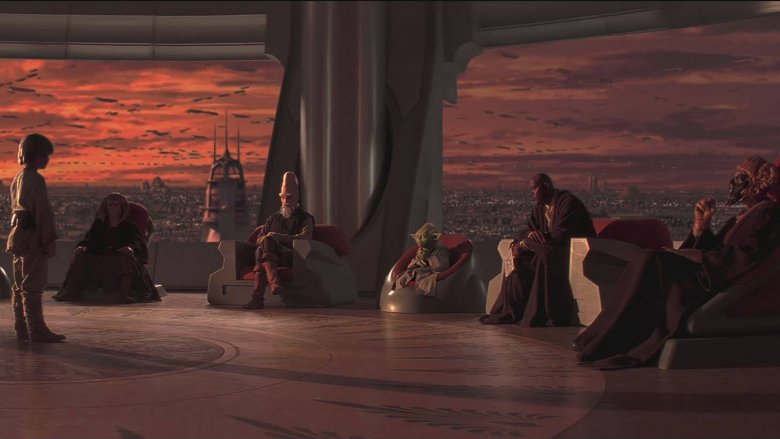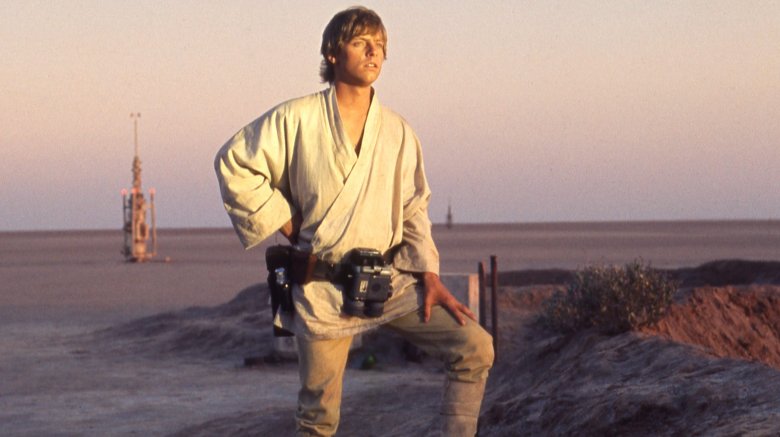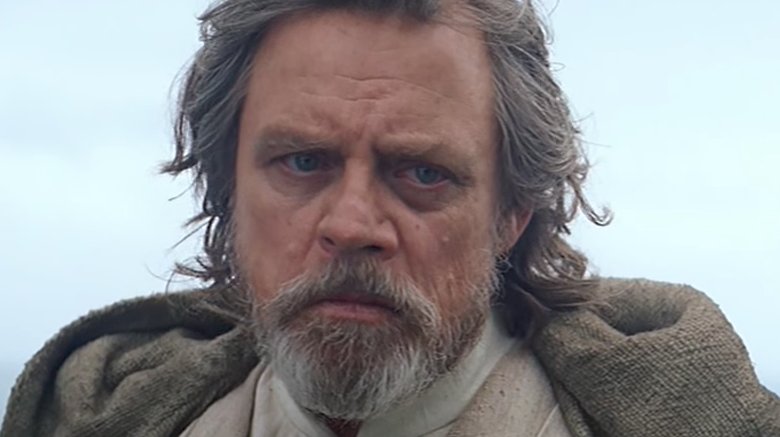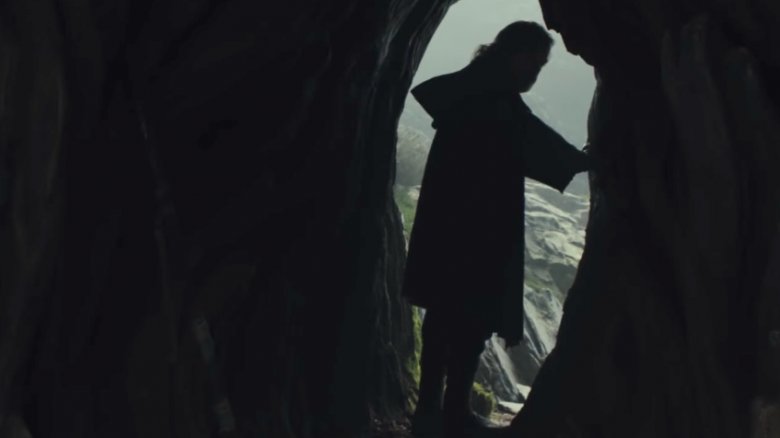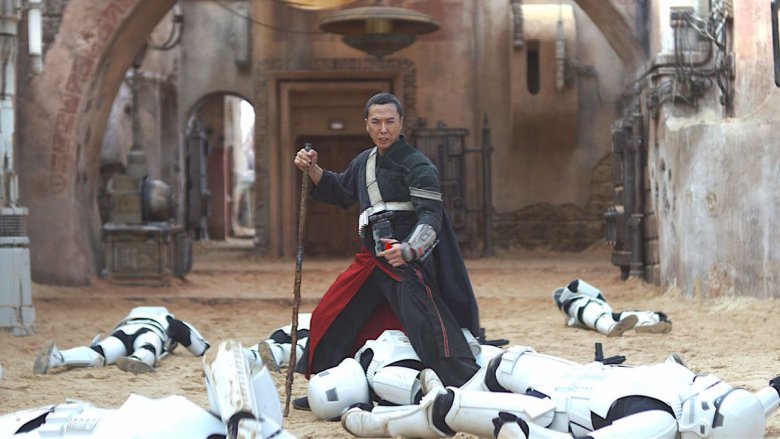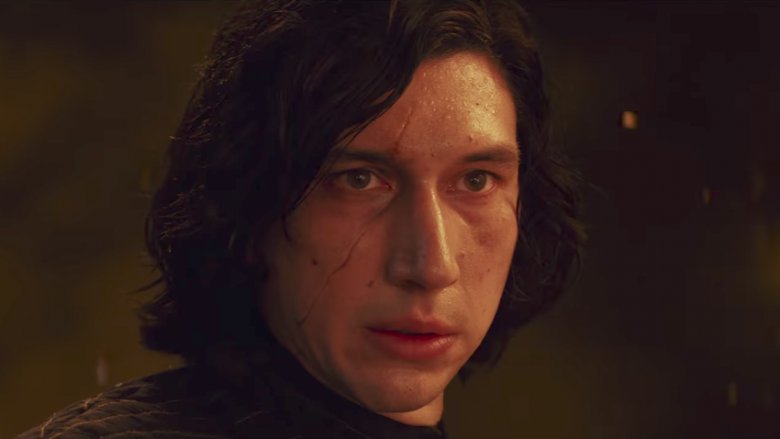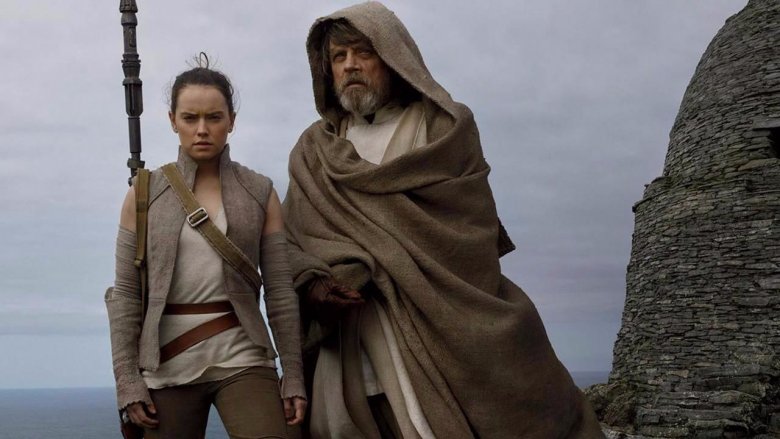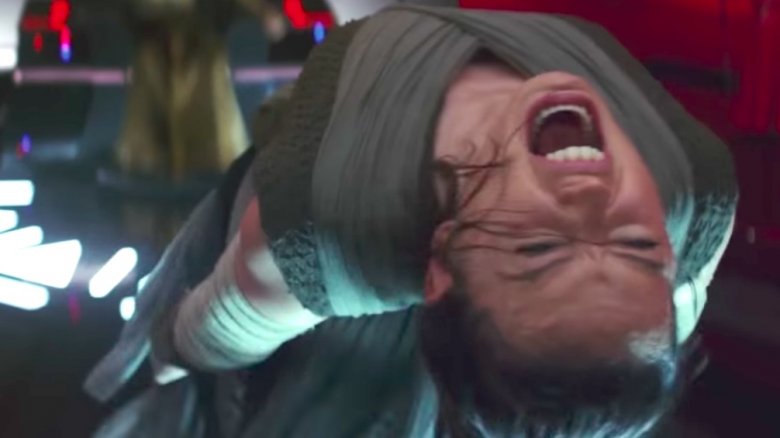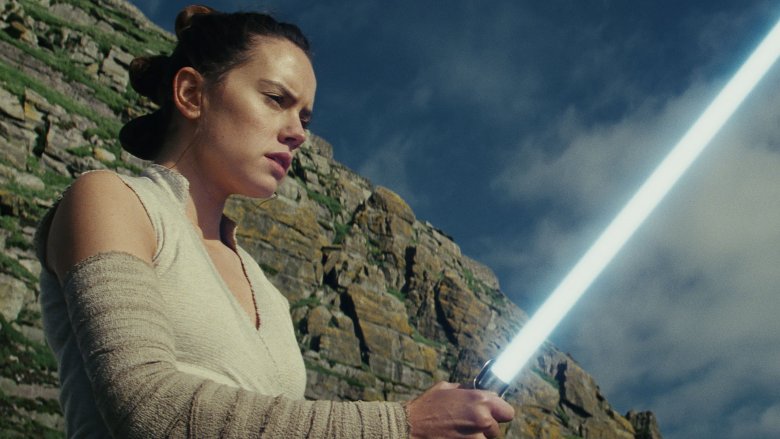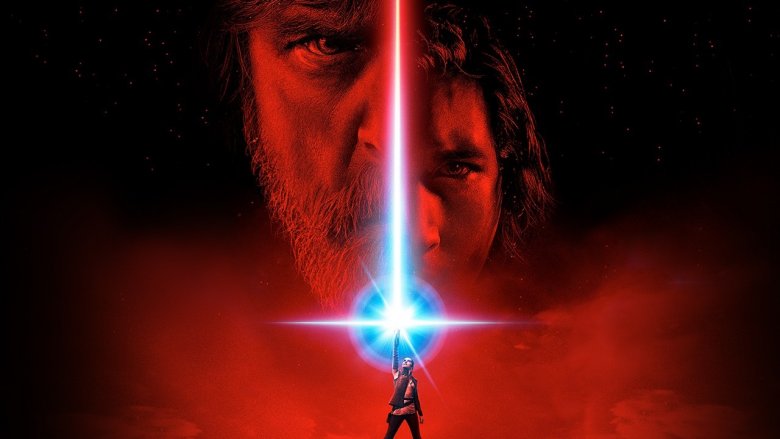What The Last Jedi Tease For Luke's Dark Turn Means For Star Wars
Luke Skywalker is the Star Wars story's constant. It's his point of view through which the audience discovers the world of the franchise. He's the hero whose journey the entire original trilogy centers on. The beginning of Luke's journey is the endgame of the prequel trilogy, and finding him is the focal point of Rey and Finn's quest in the beginning of the third trilogy. He is, in short, a reliable axis around which the franchise revolves. And in Episode VIII: The Last Jedi, he may be turning to the dark side.
Much of the marketing for the film has painted Luke as far more conflicted and darker than we've ever seen him. His demeanor has changed, and his suffering between the original trilogy and the new one is evident. Over the next two films in this trilogy, audiences may be in for a turn nobody ever expected Luke to take—one with major implications for the Star Wars franchise.
The Jedi as we know them are over
We've known a very specific version of the Jedi throughout the Star Wars franchise. The Jedi Order we meet in the prequels are a very particular incarnation, one tainted by politics, war, and in a subtle way, many of the ideals traditionally associated with the Sith. They strayed from the Jedi Code while claiming utter adherence to it, and their arrogance and blindness led to their ruin. Furthermore, while we follow Luke's path to becoming a Jedi in the original trilogy, we never see any true semblance of a new Jedi Order. We only see Luke reigniting the flame.
This brings us to The Last Jedi. If Luke, having failed at training the next generation of Jedi, has turned away from the teachings of the Jedi himself, then the Jedi as we came to know over the course of the first six Star Wars films are truly over. The last vestige of that order is gone if Luke Skywalker is straying toward the dark side.
Luke might not be the titular last Jedi
Let's get this out of the way first and foremost: yes, director Rian Johnson recently said point-blank on Twitter that Luke is the titular "last Jedi" in Episode VIII. But let's be honest here: directors lie to their audiences all the time. Heck, it's even been rather infamously done by someone currently working on Star Wars. What do you expect them to do, just spoil the whole thing before we see it? Until the movie hits theaters, it's fair game to speculate.
That being said, if Luke has begun to journey down a path of darkness, he's no longer a Jedi. He may have already denounced his title, or he may have simply strayed so far from his former path that the term no longer applies to him, whether he likes it or not. This means that the term "the last Jedi" could still be in reference to any number of people. It could be plural, or it could be meant to be taken in the past tense. Perhaps what Johnson means is not that Luke is the last Jedi, but rather that he was.
Luke might not have been the Chosen One
Much of the prequel trilogy revolves around an ancient Jedi prophecy foretelling a Chosen One who would bring balance to the Force. It was presumed by the Jedi Order to be Anakin—and, well, we all know how that worked out. (Yes, you could argue that he still fulfills the prophecy when he kills Palpatine, but then again, he also literally murdered children in the process.) Before The Force Awakens launched the third trilogy, it was easy to assume that Luke was the true Chosen One, as he seemed poised to bring balance to the Force at the end of Return of the Jedi.
But he didn't.
We're told in Episode VII that before the events of The Force Awakens, Luke was training the next generation of Jedi. He was betrayed by his apprentice, his nephew Ben Solo; Ben's turn to the First Order—and transformation into Kylo Ren—led to the destruction of the new Jedi academy and caused Luke to retreat to a life of solitude, apparently searching for the first Jedi Temple.
Is it a dark turn or a rejection of the Jedi/Sith binary?
The teachings of the Jedi Order adhere to a strict set of philosophies that form a stark contrast with those of the Sith. In short, the Jedi believe emotions dictating action leads to the dark side, whereas the Sith embrace the full spectrum of emotion, good and bad. Previous Star Wars films have taught us that to turn from the teachings of the Jedi is to turn to the dark side, but as explored with characters like Ahsoka in the TV shows Clone Wars and Rebels, this isn't necessarily the case.
The Last Jedi heavily teases a darker turn for Luke Skywalker, but what if that darker turn isn't necessarily to the dark side? What if, in rejecting the teachings of the Jedi, he does the same with those of the Sith—and whatever value system being taught by the First Order's Supreme Master Snoke? Luke isn't necessarily evil—he could be our the first cinematic Gray Jedi.
The Jedi and Sith don't define the Force
In 2016's Star Wars prequel Rogue One, we're introduced to the Guardians of the Whills, an order of monks including the Force-sensitive blind warrior Chirrut Imwe, who believe in spreading the wisdom of the Force despite not being actual Jedi. The Guardians are a crucial addition to the world of Star Wars because they provide the audience with evidence that the Force isn't explicitly defined by the Jedi and Sith. It's an ever-present, ever-flowing power that affects the lives of all beings in the galaxy. Until then, the movies had only shown us the Force as something channeled and utilized by the Jedi and Sith. The Guardians make it clear that there's much more to the story.
This is immensely important going into The Last Jedi. If Luke has indeed turned to the dark side, it's important to remember that the Force lives on. He isn't its sole guardian, its sole tie to the galaxy. It will find others. It will always seek balance.
The Skywalkers are doomed
Anakin became Darth Vader. Ben Solo, son of a Skywalker, became Kylo Ren. And now Luke has failed at passing the way of the Jedi on to the next generation. For a family rife with not one but two potential Chosen Ones meant to be the heroes who saved the Jedi and brought balance back to the Force, that seems like a pretty lousy track record. At some point we've got to ask ourselves: are the Skywalkers doomed?
Yes, the Force and those who use it are always in a state of flux, in balance one minute and out of it the next. But the Skywalkers in particular have a more tumultuous relationship with it. Furthermore, each Skywalker seems to ultimately doom the next. Anakin may have saved Luke, but his time as Vader inspired Ben's turn to the dark side. And Luke himself failed to teach Ben the ways of the Jedi and allowed him to be seduced by Snoke and the dark side. If Luke is not, in fact, the Chosen One, and he has turned away from the light, the Skywalker family may not receive another chance. Their story, at least as it relates to being guardians of the Force, may well be over.
Rey will not be a Jedi in the traditional sense
Rey is a tremendously powerful Force user and certainly seems to be on the side of good. But if Luke has turned to the dark side, or even strayed from the Jedi path, he's no longer a Jedi—in which case Rey won't be either.
While we're being led to believe that Rey will be, as per tradition, a Jedi Master's padawan, it's becoming more and more clear that that's not the case. Luke is shown to be teaching Rey how to command her powers and how to become more in touch with the Force, but that isn't the same thing as a Jedi Master training a padawan. And learning to better command the Force won't automatically make her a Jedi. How can she be, if the man teaching her isn't one himself?
Rey will be exposed to the dark side
There's only one person who can teach Rey what her powers mean and how she should use them, and it's Luke. And with Luke seeming to stray further away from the traditional teachings of the Jedi, we're sure Rey will be exposed to elements of the dark side during her training. Her journey through the Force will be shaped by her teacher, and her teacher is very clearly in a grim place.
This is not to say that Rey will be evil, or even that her learning more about the dark side is a bad thing. The strict adherence to a binary philosophy of good and evil is what led to the fall of the Jedi to begin with. Rather, it would seem likely that Rey is going to be taught not to suppress and control her emotions, but to let them guide her when the time is right. One of the great lessons characters have learned over the course of the original six films is that the Jedi were wrong to suppress their emotions entirely. Part of what made Luke so powerful is that he knew when to embrace emotion and when to act more objectively. This lesson will likely be passed on to Rey.
Rey will save Luke
Luke Skywalker's entire modus operandi is screwing up and somebody having to step in and save him. He got his clocked cleaned by a Tusken Raider, and Obi-Wan saved his life. He couldn't defeat Vader in Empire, and his friends had to swoop the Falcon around and catch him as he fell through the sky. He couldn't even beat Palpatine without his dad stepping in to finish the job. It's part of why Luke is such a great everyman protagonist—he messes up just as often as normal folks. But it looks like in The Last Jedi, Luke is grappling with the consequences of a multitude of mistakes, ones that have affected him irrevocably.
And that's where Rey comes in. The previews we've seen have depicted Luke as Rey's mentor, and that will be the case on a certain level. But if Luke has turned away from the side of light, we also may be in for something more emotionally poignant and subtle. Luke, from the moment he steps onscreen in The Force Awakens, is clearly in desperate need of saving—this time from himself. And with Rey's arrival, he's suddenly face-to-face with a pure-hearted young Force user who will restore his faith. Rey thinks she's here to bring Luke back to save the galaxy, but the truth is that she's here to save him.
The Jedi will never die
Star Wars is a story held together by the journey of the Jedi, from their arrogance leading to their fall all the way to their rebirth through Luke in the original trilogy. But the Force and the Jedi, as mentioned, are always in flux. The Jedi existed long before the events we see in the prequels, and despite what Luke may think, they'll exist long after he is gone.
Luke turning away from the Jedi path doesn't mean the Jedi will never be seen again. The Force will always be there, flowing through new users and drawing them to enlightenment. Perhaps what we're going to see in Episode VIII and Episode IX is not the death of the Jedi or the failure of Luke Skywalker, even if he's turned toward the dark side. What we'll see instead is the Jedi's true rebirth—not as the militaristic, corrupt warlords we meet in the prequel trilogy, and not in the form of one boy realizing his potential as he fights for the fate of the galaxy. Instead, we'll see the Jedi as they were meant to be: the altruistic guardians of all life in the galaxy, and a true force of pure good.
